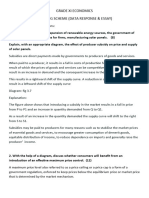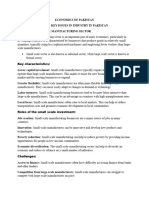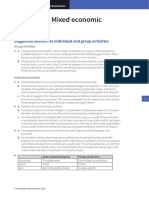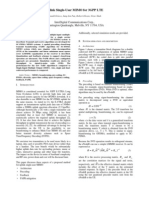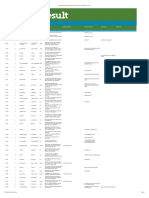And Reselling It Back To Citizens at Lower Prices
And Reselling It Back To Citizens at Lower Prices
Uploaded by
nakul_sehgal_2Copyright:
Available Formats
And Reselling It Back To Citizens at Lower Prices
And Reselling It Back To Citizens at Lower Prices
Uploaded by
nakul_sehgal_2Original Title
Copyright
Available Formats
Share this document
Did you find this document useful?
Is this content inappropriate?
Copyright:
Available Formats
And Reselling It Back To Citizens at Lower Prices
And Reselling It Back To Citizens at Lower Prices
Uploaded by
nakul_sehgal_2Copyright:
Available Formats
Good morning one and all present.
The topic before the house today is TH being the house of India believes that by destroying the subsidies on fossil fuels, we promote creation of a more sound fiscal policy and promotion of other sustainable forms of energy. Being the proposition, its my prerogative to define the key term in this motion Here, Subsidies are essentially the government buying energy at market prices and reselling it back to citizens at lower prices. Subsidies are at their best when they are well-targeted, transparent and suitably designed for implementation. The subsidies in today's context shelter inefficiencies, distortion of markets and their opaque, undiscerned and uncontrolled growth can have a deleterious impact on the country's finances.
My speech today focuses primarily on four constructives. I will highlight the Current economic scenario of India and its inefficiencies, how fuel subsidies have often failed to reach the intended beneficiaries. I will elaborate on how cutting fuel subsidies will incentivize development of other forms of energy and how we need to address and prioritize other key issues in the country. 1. The fuel subsidy burden for fiscal is higher than ever arising from a combination of high crude oil prices, depreciating local currency, and a lack of government reforms with regard to its grip on regulated fuel prices that prevents downstream companies from passing on higher prices to consumers. In the absence of reform, the subsidy burden will increase even further as the consumption volumes rise and the local currency depreciates further. Indias growing oil import bill is seen as the main driver behind the large current account deficit,India needs to raise the price of heavily subsidized diesel to rein in its fiscal deficit and counter the threat of becoming the first of the big emerging economies to be downgraded to junk. Fuel subsidies are generally only possible when a country has windfall revenue in either resources, such as oil in Nigeria, or in trade surpluses, such as Chinas. Both of which India clearly lacks. 2. Economic inefficiencies Discourages Investment Inefficient subsidies on petroleum products and electricity burden fiscal accounts of the governments, incentivize diversion and misuse, and create barriers against private players from entering the market. Subsidies on fossil fuels discourage investment in cleaner forms of energy. Ending excessive and wasteful support for fossil fuels would reduce greenhouse gas
emissions that lead to global warming. The money saved from fossil fuel subsidies could be used to promote clean energy and energy efficiency alternatives, which would be in line with public opinion. Undistorted pricing of fuels, along with an efficient delivery mechanism of subsidy, will meet the government objective and discourage any perverse incentives created for overuse of fuel, besides encouraging a shift towards cleaner sources of energy.
3. Unintended usage of subsidized fuel The government has been subsidizing fuels to protect consumers from international price volatility and to make energy affordable in the economy. However, fuel subsidies, often fail to reach the intended beneficiaries. Moreover, there are questions regarding how far these subsidies are benefitting the poor. A larger share of LPG subsidy is consumed by well-off households. Subsidies tend to self-perpetuate; acquire political hues and become linked to populism. They encourage wasteful consumption of resources because people get used to a certain level of usage minimizing the need to develop a more energyefficient fuel. Indian policy makers tend to consider diesel a poor mans fuel because it is used by trucks and buses and by millions of farmers who pump water from deep wells to irrigate their fields. Manufacturers, offices and householders use diesel to fuel the generators that provide back-up electricity during frequent power cuts. But the widening gap between petrol and diesel prices has also prompted a surge in demand for diesel-fuelled cars, including sports utility vehicles, for the middle class, which has helped increase rising demand for diesel. Further since the distribution channels of subsidies are caught in bureaucracy and red-tape; corruption is commonplace.
4. One of the most obvious benefits of ending fuel subsidies is increasing the availability of public money. There is a high need of prioritization and in Indian economy, resources are limited and have alternate uses. The need of the hour is to develop basic facilities like healthcare, educational facilities and food for the citizens. This will help build longterm human capital that will allow us to remove poverty and sustain the lowerincome segments of the society.
In the end, lets evaluate subsidies using these 3 questions Do they serve Public or private interest? Clearly private! Are they Achieving the desired objectives? An emphatic NO And they have ve consequences like environmental degradation and corruption. Is
this the way forward? Certainly not! Thus we need to destroy these subsidies to create a responsible fiscal policy that paves the way for a green and resurgent economy.
You might also like
- High Yield NBME Images AnnotatedDocument84 pagesHigh Yield NBME Images AnnotatedNareman Abd El HadeNo ratings yet
- TCS 6sigmaDocument17 pagesTCS 6sigmanakul_sehgal_2No ratings yet
- Notes 4.5 Advantages and Disadvantages of SubsidiesDocument2 pagesNotes 4.5 Advantages and Disadvantages of Subsidiesserraj44% (9)
- Team - Dazzles Mnit Jaipur (Report Summary)Document2 pagesTeam - Dazzles Mnit Jaipur (Report Summary)Jas BungNo ratings yet
- A. Critically Analyze The Issue of Energy Subsidies and Their Impact On An Economy. Who Are The Ultimate Beneficiaries of Such Subsidies?Document3 pagesA. Critically Analyze The Issue of Energy Subsidies and Their Impact On An Economy. Who Are The Ultimate Beneficiaries of Such Subsidies?dasarup24123No ratings yet
- The News About Increase in Fuel Prices Always Warmly To DiscussedDocument2 pagesThe News About Increase in Fuel Prices Always Warmly To DiscussedsherinautamaNo ratings yet
- Whose Subsidy Is It Anyway?Document7 pagesWhose Subsidy Is It Anyway?dundunNo ratings yet
- Cairn-Ace Ii: Underdoggs Great Lakes Institute of Management, GurgaonDocument10 pagesCairn-Ace Ii: Underdoggs Great Lakes Institute of Management, GurgaonAnuj PundirNo ratings yet
- Expenditure Management CommissionDocument36 pagesExpenditure Management CommissionaronNo ratings yet
- Simple EconomicsDocument4 pagesSimple Economicsnarendran ramanNo ratings yet
- Fuel (BBM) Subsidy in IndonesiaDocument13 pagesFuel (BBM) Subsidy in IndonesiaEmilliana AngelineNo ratings yet
- Material For EcoDocument4 pagesMaterial For EcoParul KhannaNo ratings yet
- The Removal of Fuel Subsidies Kills Community: Thanks YouDocument1 pageThe Removal of Fuel Subsidies Kills Community: Thanks YouDedi Herawadi YusufNo ratings yet
- Research Argument Essay Rough DraftDocument7 pagesResearch Argument Essay Rough DraftDayna RodriguezNo ratings yet
- Section 4 TB Fourpart Q-ADocument17 pagesSection 4 TB Fourpart Q-AmaaheerjainNo ratings yet
- IGCSE Economics Self Assessment Chapter 24 AnswersDocument2 pagesIGCSE Economics Self Assessment Chapter 24 AnswersDesre100% (1)
- Literature Review On Fuel SubsidyDocument8 pagesLiterature Review On Fuel Subsidyaflsgzobe100% (1)
- Literature Review On Fuel Subsidy RemovalDocument7 pagesLiterature Review On Fuel Subsidy Removalafmabbpoksbfdp100% (1)
- PrivitiIzation CPDocument135 pagesPrivitiIzation CPSeed Rock ZooNo ratings yet
- Eco W/S - Discussion QDocument4 pagesEco W/S - Discussion Qshamant saiNo ratings yet
- Electric Vehicles.Document12 pagesElectric Vehicles.Shubhra KediaNo ratings yet
- OIL Subsidies: Are We Stealing From Future Generation ? Executive SummaryDocument2 pagesOIL Subsidies: Are We Stealing From Future Generation ? Executive Summaryanubhav1109No ratings yet
- Green EconomyDocument5 pagesGreen EconomyDanush SiriwardanaNo ratings yet
- Grade 11-Sample Data Response QuestionsDocument17 pagesGrade 11-Sample Data Response QuestionsKartiki KanekarNo ratings yet
- PAKISTANDocument11 pagesPAKISTANHumaira KhanNo ratings yet
- Alt Fuels ConclusionDocument2 pagesAlt Fuels ConclusionpriyaNo ratings yet
- Chapter 1 Introduction To SubsidyDocument31 pagesChapter 1 Introduction To SubsidyolkpqNo ratings yet
- Tejvan Pettinger: Poor InformationDocument6 pagesTejvan Pettinger: Poor InformationtawandaNo ratings yet
- New Idea Generation: InnovationDocument22 pagesNew Idea Generation: Innovationqasim aliNo ratings yet
- Process of Capital FormationDocument2 pagesProcess of Capital Formationmanishaamba7547100% (2)
- Data Response 2023Document20 pagesData Response 2023Jenney TatNo ratings yet
- Price ControlsDocument5 pagesPrice ControlsAnanya ShardaNo ratings yet
- Rizal Technological University Boni Avenue, Mandaluyong CityDocument17 pagesRizal Technological University Boni Avenue, Mandaluyong CityJielyn San Miguel0% (1)
- Scope For PrivatizationDocument6 pagesScope For PrivatizationPushpaNo ratings yet
- Shubh AmDocument18 pagesShubh AmSubhojoy BanerjeeNo ratings yet
- Who Benefits From Government Polices ToDocument5 pagesWho Benefits From Government Polices ToLim Jin FoongNo ratings yet
- IFPRI Discussion Paper 01071 March 2011 Petroleum Subsidies in Yemen Leveraging Reform For DevelopmentDocument32 pagesIFPRI Discussion Paper 01071 March 2011 Petroleum Subsidies in Yemen Leveraging Reform For DevelopmentYemen ExposedNo ratings yet
- Economic Survey 2015 SummaryDocument30 pagesEconomic Survey 2015 SummaryAbhishek GoyalNo ratings yet
- Course: Business Economics PROJECT: COVID-19: The Global Shutdown Instructions For The SubmissionDocument6 pagesCourse: Business Economics PROJECT: COVID-19: The Global Shutdown Instructions For The Submissionkalki17No ratings yet
- IGCSE Economics Self Assessment Chapter 15 AnswersDocument3 pagesIGCSE Economics Self Assessment Chapter 15 AnswersDesre100% (2)
- LT 234Document10 pagesLT 234siamrahman994No ratings yet
- Subsidies in India PDFDocument29 pagesSubsidies in India PDFdimpleNo ratings yet
- Managerial Case Study Report EconomicsDocument5 pagesManagerial Case Study Report EconomicsDeepthi VishwanathanNo ratings yet
- Economics1 114333Document7 pagesEconomics1 114333ITACHI UCHIHANo ratings yet
- Resource Allocation in Developing CountriesDocument5 pagesResource Allocation in Developing CountriesKashif Ali100% (1)
- Strategies To Achieve Sustainable Economic GrowthDocument6 pagesStrategies To Achieve Sustainable Economic GrowthMaryam ZafarNo ratings yet
- Chapter 7 External Economic Influences On Business ActivityDocument3 pagesChapter 7 External Economic Influences On Business ActivityVakim KNo ratings yet
- Is FDI in Retail India's Most Pressing Issue Today? Raise Your Voice - Part 3Document17 pagesIs FDI in Retail India's Most Pressing Issue Today? Raise Your Voice - Part 3SonakshiFaujdarNo ratings yet
- A Subsidy Is A Benefit Given To An IndividualDocument10 pagesA Subsidy Is A Benefit Given To An IndividualJasmi Mat JusohNo ratings yet
- Citizen Education - Engagement Strategy Document - Understanding Fuel Subsidy Removal and Its Economic and Social Impact (1) - 1686042059Document10 pagesCitizen Education - Engagement Strategy Document - Understanding Fuel Subsidy Removal and Its Economic and Social Impact (1) - 1686042059helloprimaltNo ratings yet
- Managerial Economics Assignment - I: Gurumoorthy N F13084 Section - BDocument6 pagesManagerial Economics Assignment - I: Gurumoorthy N F13084 Section - BGurumoorthy NagarajanNo ratings yet
- Chapter 4 - Government Subsidies - Policy Perspectives: See Speech atDocument43 pagesChapter 4 - Government Subsidies - Policy Perspectives: See Speech atnitish kumar twariNo ratings yet
- Effects of Public Expenditure On Economy Production DistributionDocument6 pagesEffects of Public Expenditure On Economy Production DistributionNøthîñgLîfèNo ratings yet
- Subsidies: Some Work, Others Don't: Some Government Subsidies Make Sense, But Often There Are DownsidesDocument2 pagesSubsidies: Some Work, Others Don't: Some Government Subsidies Make Sense, But Often There Are DownsidesChess NutsNo ratings yet
- Subsidy Rationalisation 31may2011Document8 pagesSubsidy Rationalisation 31may2011Nas SagNo ratings yet
- Economic Influences On Business ActivityDocument22 pagesEconomic Influences On Business Activitywaniahnoor15No ratings yet
- LPG Reforms in India 1Document7 pagesLPG Reforms in India 1itsvanshikaushalyaNo ratings yet
- Taxation On Petrol and OilDocument2 pagesTaxation On Petrol and OilayselrahimzadehNo ratings yet
- Eco539 Intermediate MicroeconomicsDocument10 pagesEco539 Intermediate MicroeconomicsMOHD REDZUAN BIN A KARIM (MOH-NEGERISEMBILAN)No ratings yet
- Public Finance Assignment - WPSDocument6 pagesPublic Finance Assignment - WPSzambogo7No ratings yet
- Stop Fuel Fraud: © 2013 Authentix. All Rights ReservedDocument26 pagesStop Fuel Fraud: © 2013 Authentix. All Rights ReservedRoyalSam VernekarNo ratings yet
- Entrepreneurs Are Born, Not Made-AgainstDocument2 pagesEntrepreneurs Are Born, Not Made-Againstnakul_sehgal_2100% (2)
- SpiritualityDocument2 pagesSpiritualitynakul_sehgal_2No ratings yet
- Right To Freedom of Expression Not Only Exists in The Constitution, But Can (& Should) Be PractisedDocument8 pagesRight To Freedom of Expression Not Only Exists in The Constitution, But Can (& Should) Be Practisednakul_sehgal_2No ratings yet
- Democratic. With India As A Member, The Council Would Be A More Legitimate and Thus A More Effective Body... " - Robert WilcoxDocument3 pagesDemocratic. With India As A Member, The Council Would Be A More Legitimate and Thus A More Effective Body... " - Robert Wilcoxnakul_sehgal_2No ratings yet
- Census 2Document11 pagesCensus 2nakul_sehgal_2No ratings yet
- Operations Research 289706179Document39 pagesOperations Research 289706179nakul_sehgal_2No ratings yet
- This House Believes ThatDocument9 pagesThis House Believes Thatnakul_sehgal_2No ratings yet
- Rights Vs DutiesDocument2 pagesRights Vs Dutiesnakul_sehgal_2No ratings yet
- Operations Research 289706179Document39 pagesOperations Research 289706179nakul_sehgal_2No ratings yet
- Activities Guide and Evaluation Rubric - Unit 2 - Phase 2 - Creation of Materials and StrategiesDocument8 pagesActivities Guide and Evaluation Rubric - Unit 2 - Phase 2 - Creation of Materials and Strategiesjaider gòmez vegaNo ratings yet
- Motor Vehicle Warranty PolicyDocument10 pagesMotor Vehicle Warranty PolicyVenkat SaiNo ratings yet
- Introduction To Data WarehousingDocument5 pagesIntroduction To Data WarehousingMJ CREATIONSNo ratings yet
- The Sweat Lodge CeremonyDocument2 pagesThe Sweat Lodge CeremonyLeo RutherfordNo ratings yet
- PlanimetryDocument1 pagePlanimetrytedin oviedoNo ratings yet
- Deloitte - Arunabh ThakurDocument1 pageDeloitte - Arunabh ThakurAshok SharmaNo ratings yet
- CH 12 The Brain and Spinal CordDocument27 pagesCH 12 The Brain and Spinal Cord5wj7kh2mbcNo ratings yet
- Millat TractorsDocument23 pagesMillat Tractorstaimoor01No ratings yet
- Chapter 12 Study Guide - AnswersDocument5 pagesChapter 12 Study Guide - AnswersKatherine DunhamNo ratings yet
- Alberto Jonas Master School and Its Role in Early Twentieth-Century Piano Virtuosity PDFDocument96 pagesAlberto Jonas Master School and Its Role in Early Twentieth-Century Piano Virtuosity PDFCapitan Swank100% (1)
- Open Book Assesment 2Document3 pagesOpen Book Assesment 2Anand Munshi100% (2)
- Combining Support and Resistance Levels With Supply and Demand ZonesDocument8 pagesCombining Support and Resistance Levels With Supply and Demand Zonesmajid abbasNo ratings yet
- Easylyte - Electrolyte Analyzer - Medica CorporationDocument1 pageEasylyte - Electrolyte Analyzer - Medica CorporationToshko AndreevNo ratings yet
- Uplink Single-User MIMO For 3GPP LTE: AbstractDocument5 pagesUplink Single-User MIMO For 3GPP LTE: AbstractRudynoNo ratings yet
- Bilirubin Total-2303-00945Document1 pageBilirubin Total-2303-00945adiljuttNo ratings yet
- T-ZED Homes, Whitefield, BengaluruDocument5 pagesT-ZED Homes, Whitefield, BengaluruHello ShraaNo ratings yet
- EnglishDocument2 pagesEnglishg-56364344No ratings yet
- Graylands Hospital Drug Bulletin: Medications and Electroconvulsive TherapyDocument9 pagesGraylands Hospital Drug Bulletin: Medications and Electroconvulsive TherapyRoshita G PillaiNo ratings yet
- CV9202H A39Document49 pagesCV9202H A39Zoi LleshiNo ratings yet
- Aloha Lecture Notes: FaadooengineersDocument3 pagesAloha Lecture Notes: Faadooengineerstooba mukhtarNo ratings yet
- Indian AestheticsDocument92 pagesIndian Aestheticsbadminton12No ratings yet
- SCC PIW SD PE Taman Salmon SG BulohDocument4 pagesSCC PIW SD PE Taman Salmon SG BulohJohan RamliNo ratings yet
- Adaptive ControlDocument29 pagesAdaptive Controlsam0025No ratings yet
- Factors Affecting The Velocity of Sound in A GasDocument2 pagesFactors Affecting The Velocity of Sound in A GasShuvam ShahNo ratings yet
- CAE Result New Wordlist Unit 1 WorkbookDocument3 pagesCAE Result New Wordlist Unit 1 WorkbookH AzNo ratings yet
- Leslie Torino Calcetas: Bachelor of Science in Accountancy Bachelor of Science in Accounting ManagementDocument2 pagesLeslie Torino Calcetas: Bachelor of Science in Accountancy Bachelor of Science in Accounting ManagementQwe RulpoNo ratings yet
- Integration OF Studies: On AluminumDocument324 pagesIntegration OF Studies: On AluminumspiritveluNo ratings yet
- What Is The Best and Free Alternative For ClickFunnels?Document14 pagesWhat Is The Best and Free Alternative For ClickFunnels?Dheeraj KokkoriNo ratings yet
- Hand Power Tool TrainingDocument29 pagesHand Power Tool TrainingSobit ThapaNo ratings yet























